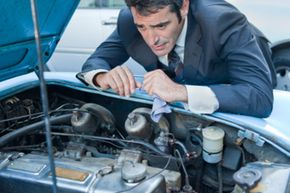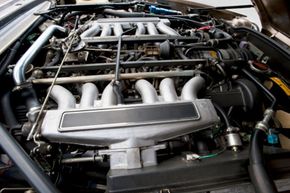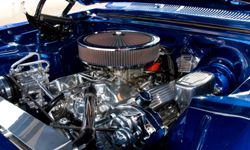Fuel should burn in even waves that are timed to the engine's cycles, carrying through until the next cycle causes the next wave. When fuel is improperly ignited, it causes a fireball-like explosion that can interfere with the engine's cycles and can even damage engine components -- these premature detonations are the source of the "ping" noise. Now, let's look at the most common causes of knock.
Low quality fuel
One of the causes of engine knock is sub-par gasoline -- low quality and low octane fuel can cause a whole cluster of problems, such as increased combustion chamber temperatures and higher cylinder pressures. The fuel's octane rating tells a motorist how much compression the gasoline can tolerate -- the higher the rating, the better the fuel resists combustion. That's why complicated, high-pressure engines require more expensive fuel.
These problems can lead to pre-ignition, which is when the fuel burns in the engine earlier than it should. There are two ways gasoline can ignite in the engine's combustion chamber -- from the spark plug, or from an incorrect compression ratio. It's a delicate balance, and any factor can throw the whole process awry. If the engine's compression is too low, it can cause the fuel to combust and burn before it's ignited by the spark plug. When the fuel burns this way, it burns incompletely, and the leftover fuel components and compounds cause debris that sticks to the inside of the chamber. This buildup negatively affects the environment within the cylinders, which is a common cause of engine knock.
Deposits on the cylinder walls
Yes, it's a vicious cycle -- the first cause of engine knock we discussed above can create bigger problems. Low quality fuel and pre-ignition forms the harmful deposits we mentioned, and once those deposits start, they tend to build.
These deposits take up crucial space that's needed for the engine's normal functions of mixing air and fuel. Think of a blood vessel clogged by cholesterol deposits -- the bigger the clog, the less blood can get through. This is similar. Big deposits raise compression in the cylinder, and if that higher compression isn't somehow accounted for (like using higher octane gasoline or adjusting the engine's temperature ranges), the higher compression can cause knocking.
The wrong spark plugs
Using the incorrect spark plugs is a common problem, according to experts. People often misunderstand the manufacturer's recommendations, or buy the incorrect plugs to try to save a few bucks. Since spark plugs help control the engine's internal environment and operate under precise conditions, the wrong plugs create sub-par conditions for burning fuel. They can lead to combustion chamber deposit buildup and improper running temperatures, which, as we already know, are two major catalysts for engine knock.
Other causes are closely related to the three most common culprits, and include dirty injectors, a bad knock sensor, worn rings and valve seals, and the possibility of the engine simply running too hot [source: Allen].
On the next page, we'll discuss ways to help restore an engine to proper running conditions.



